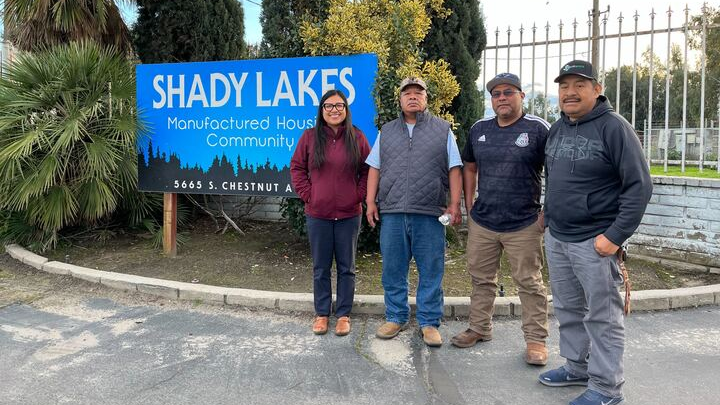
These mobile home residents decided to buy their park to combat rising rents
These mobile home residents decided to buy their park to combat rising rents

Mobile homes are an often overlooked but crucial part of this country’s affordable housing stock. While residents may own their manufactured home or trailer outright, they usually have to pay rent for the land it sits on.
In California a group of mobile home park residents have done something that might seem impossible. They purchased their park from their corporate landlord, securing stable affordable housing for themselves. But the road to get there wasn’t easy.
When Juanita Perez Sierra was seven years old, her parents moved their family of eight from San Miguel Cuevas in Oaxaca, Mexico, to the U.S. After weeks of living out of their van, her parents purchased a home at Shady Lakes Mobile Home Park in Fresno County.
“We were so happy to finally have a place to call home” she said in Spanish. “And that’s why we still have so much love for this place.”
Perez Sierra’s family was one of the first from San Miguel Cuevas to move there, some 30 years ago. Now, the vast majority of the park’s 60 families are from her same Oaxacan village.
“We always felt safe there, the landlords were easy going,” she said. “But the situation changed overnight.”
In 2019, a Stockton-based corporation named Harmony Communities California purchased the park. Several residents say the new landlord started enforcing different rules and issuing eviction notices.
Resident Marcelino Santos said he began to worry his family would get kicked out and become homeless.
“We had no idea where we would go. It was stressful thinking if they kicked us out where would we go?” he said in Spanish.
The community, made up of mostly farm workers, had chosen the park because of the low rent. But soon after Harmony came in, residents say the company increased rent by more than 30%.
So the residents decided to fight back. They formed the Grupo Comunitario de San Miguel Cuevas, and got legal aid. They sued Harmony over alleged poor management of the park and retaliation against residents. Harmony declined an interview and did not respond to questions about the allegations.
As the lawsuit moved forward, something unexpected happened: A nonprofit that helps residents form housing cooperatives got in touch.
“And [we] began having conversations about the potential of this park becoming a resident owned community,” said Mariah Thompson, the resident’s attorney, “to sort of take those mobile home parks off the free market, off the private investment market and so they can remain resident managed and affordable.”
Under that model, the residents would each have part ownership of the park. They’d be able to make decisions about how much rent to charge, park finances and operating rules.
Thompson said residents were hesitant at first. But after months of organizing, they were ready to take on the challenge.
It took a ton of coordination on the part of residents to get 52 families to attend the zoom meetings. Not to mention the multiple nonprofits. Then there was the matter of language English, Spanish and Mixteco, the local language in Oaxaca.
“Some of these meetings looked like the UN. I mean, it was pretty incredible,” Thompson said.
They also had to get the funding, more than $7 million, to purchase the park. That required yet another organization to help them with state loans.
Eventually the corporation agreed to sell the park to residents if they dropped the lawsuit.
In all, the entire process took five years, three nonprofits and the unflappable will of residents. They finally closed the deal in February. Marcelino Santos said he hopes their story serves as an example to other mobile home park residents.
“Let us be an example that if we can do it others can too,” he said.
There’s a lot happening in the world. Through it all, Marketplace is here for you.
You rely on Marketplace to break down the world’s events and tell you how it affects you in a fact-based, approachable way. We rely on your financial support to keep making that possible.
Your donation today powers the independent journalism that you rely on. For just $5/month, you can help sustain Marketplace so we can keep reporting on the things that matter to you.

















